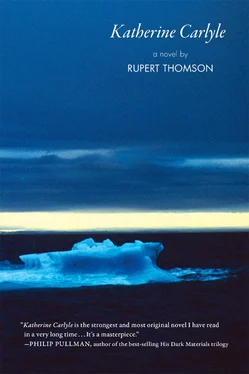“You can have your own room,” he says quickly. “For as long as you like.”
“I can’t afford to pay much money.”
“I didn’t ask for money.”
“You don’t know me. I could be anyone.”
“So could I.” He leans back in his chair. For the first time I feel a certain authority or confidence come off him. Once again I wonder what he does.
I finish my coffee. The bill arrives.
“I have an idea,” Klaus says. “Come and have a drink this evening. Then you can see the apartment for yourself.” He wants to text me his address and phone number, but I tell him I haven’t got a phone. “No phone?” Like Oswald, he doesn’t know what to make of this. In the end he jots his details down on the back of my bill. “The old-fashioned way,” he says, and smiles.
I study the address I have already memorized. “What time should I come?”
“Seven.”
As I tuck the piece of paper into my bag I think of the dozens of messages I have received in the past few months, only to ignore them. Though this one is obviously for me — I’ve provoked it, engineered it — things haven’t got much clearer. I’m reminded of Magritte’s famous painting of a man in a bowler hat positioned in front of a mirror. Since the man is painted from behind, all anyone can see is his back. And in the mirror too that’s all anyone can see.
Something jerks at the edge of my field of vision. It’s the minute hand of the clock above the bar. I look at Klaus again. His eyes, small and steady, are fastened on my face.
“Won’t you be late for work?” I say.
/
When I was twelve and a half my mother took me to a nightclub on the coast road not far from Gaèta. We parked with two wheels in a ditch, then walked down a steep path between spiky clumps of aloe vera. The lanterns that hung on thin poles, guiding people to the entrance, swayed and flickered in the warm breeze that blew in off the sea.
“We’ll have to pretend you’re sixteen.” My mother gave me a sidelong glance. “Can you manage that?”
I wasn’t sure.
“Leave it to me,” she said.
Somehow we slipped past the buttafuori , with their muscular necks, their headsets, and their immaculate tuxedoes, and once we were beyond them my mother hugged me and then stood back.
“We did it,” she said. “ You did it.”
I wish I had a photo of that moment — her face lit up and full of glee, and only the glittery Neapolitan darkness behind her.
I drank my first ever glass of prosecco that night. My mother drank two. Later, we danced. I let the music take me over. My hair grew heavy, spiny with sweat. You could go inside if you wanted, but there were outdoor dance floors too, some cut into the hillside, others down by the water. Steps that were tiled or inlaid with mosaic led from one level to the next. Intense green spotlights made the plants look hyper-real. Far below, white lines expanded sideways in the dark where the waves broke against the rocks.
A man with a shaved head asked my mother if she would dance with him.
“No,” she said. “I can’t.”
He looked puzzled. “Why not?”
“I’m dying.”
“All the more reason.”
They stood still, staring at each other. Then my mother shook her head and took my hand and led me to the low wall where we had left our drinks.
I liked the man for his directness and his restraint. Round his left bicep was a circular tattoo, an armband made of ink. His shaved head shone. When my mother turned him down he shrugged and moved away, and though he continued to watch her from a distance he didn’t approach her again. I don’t think she wanted anyone to enter the world she had conjured for us. It wouldn’t sustain another presence. It was too fragile and too rare, like bone china or gold leaf.
“I’m sorry,” she said later, when we were sitting on a bench next to the sea. “I don’t know why I said that.”
“To frighten him away,” I said.
She looked at me, her face as still and deep as water at the bottom of a well, and I thought I could see myself in it, far away and small and slightly blurred. She drew me close and kissed my hair. She told me she was proud of me and would always be proud of me. She said I should never forget that.
At two in the morning we drove north, back to Rome. A dense fog swirled around the car. We were passing through the Pontine Marshes, my mother said. Before Mussolini drained the area, it was a breeding ground for malaria. If the pumps were switched off, she told me, the water level would rise in less than a week. The fog thickened. She had to slow right down. It was as if we were motionless and big pale rags were being thrown at us. The temperature dropped and she turned the heater on. The heater — in July! Once, I peered upwards and saw a patch of dark clear sky loaded with stars, then the fog closed round the car again.
“We’re very late,” my mother said. “Your father’s going to be worried.” She sighed. “It wears me out.”
I didn’t know what to say.
“He hates me for being ill,” she said. “He thinks I’ve let him down.”
“He loves you too,” I said.
She reached across and squeezed my hand. “I know, angel. I’m sorry. You probably think I’m talking nonsense.”
“I think you’re beautiful.”
She began to cry and the trunk of a tree leapt towards us. She swerved just in time. “Oh God.” The car bumped up onto the verge. She put the handbrake on and wiped her eyes. “Fuck.” Now we were still, bits of fog drifted through the headlights like a flock of ghostly sheep.
“Are you all right?” I said.
I saw her gather herself, all the bravery and sparkle.
“You’ll have a wonderful life,” she said, “I know you will. You’ll sleep in palaces, and dance with presidents, and —”
I must have given her a funny look because she broke off and started laughing.
“You’ll see,” she said.
Then she shifted into gear and drove on.
I dozed with my forehead against the window and when I woke we were passing the Colosseum. In the moonlight it looked like a big piece of bone picked clean by vultures.
My mother looked across at me. “Say what you used to say. You remember? When you were small?”
I smiled because I knew exactly what she meant.
“Go on,” she said. “Please.”
I took a breath and turned to her.
“Are we there yet?”
/
“I love this painting.” Klaus stands next to the canvas, arms folded. “It cost half my annual salary. What do you think?”
The painting in question, which is enormous, glossy, and uniformly gray, hangs on the back wall of his living room, next to the arch that leads out to the hall.
“Very atmospheric,” I say.
“Atmospheric.” Klaus laughs. “That’s good.”
“I studied art history. At school.”
“Did you?” Still chuckling, he turns away. He runs his fingertips along the spines of a row of hardback books, then he lifts the corner of a kilim that is draped over the back of a chair and stares at it with unfeigned admiration. He seems constantly astonished by his environment, even though he’s the person who’s responsible for it.
I too step back from the painting. The woman in the cinema described Klaus’s apartment as “amazing,” and it’s easy to see why. When he first moved into the building he had four rooms, he told me earlier, but then he learned that his neighbor was returning to Hamburg. He bought her out and had the two apartments knocked into one. His living room is fifteen meters long, with huge plate-glass windows that gaze out over the city.
“I must show you the roof terrace,” he says.
I follow him up a flight of stairs and out through a glass door. Dusk is descending fast and the sky has turned a shade of turquoise that makes the nearby roof tiles look magenta. A high-rise with the logo BHW on top lifts clear of all the other buildings. In the fading light it appears oddly insubstantial, almost transparent, like a portal. I swing round slowly, the breath shallow in my lungs. To the northwest, on the horizon, there is evidence of industry, smoke trailing from three tall chimneys.
Читать дальше












